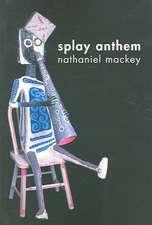Rumors of War and Infernal Machines: Technomilitary Agenda-Setting in American and British Speculative Fiction
Autor Charles E. Gannonen Limba Engleză Paperback – 31 iul 2005
Preț: 408.00 lei
Nou
Puncte Express: 612
Preț estimativ în valută:
78.08€ • 84.78$ • 65.59£
78.08€ • 84.78$ • 65.59£
Carte tipărită la comandă
Livrare economică 23 aprilie-07 mai
Preluare comenzi: 021 569.72.76
Specificații
ISBN-13: 9780742540354
ISBN-10: 0742540359
Pagini: 312
Dimensiuni: 153 x 228 x 18 mm
Greutate: 0.45 kg
Ediția:Rowman & Little.
Editura: Rowman & Littlefield
ISBN-10: 0742540359
Pagini: 312
Dimensiuni: 153 x 228 x 18 mm
Greutate: 0.45 kg
Ediția:Rowman & Little.
Editura: Rowman & Littlefield
Notă biografică
Cuprins
Chapter 1 Introduction: Assessing Rumors-of War and Infernal Machines Chapter 2 Armageddon by Gaslight: Victorian Visions of Apocalypse Chapter 3 Opportunistic Anticipations and Accidental Insights: William Le Queux's Exploitation of Edwardian Invasion Anxieties Chapter 4 Promoters of the Probable, Prophets of the Possible: Technological Innovation and Edwardian Near-Future War Fiction Chapter 5 H.G. Wells: The Far-Future War Prophet of Edwardian England Chapter 6 Hard Numbers, Hard Cases, Hard Decisions: Politics and Future-War Fiction in America Chapter 7 An Imperfect Future Tense(d): Anticipations of Atomic Annihilation in Post-War American Science Fiction Chapter 8 Nuclear Fiction and Silo Psychosis: Narratives of Life in the Shadow of a Mushroom Cloud Chapter 9 Radio Waves, Death Rays, and Transgressive (Sub)Texts: Future-War Fiction in the Wide Black Yonder Chapter 10 Making Man-Machines of Mass Destruction: Future-War Authors as Seers in an Age of Cyborg Soldiers Chapter 11 Cultural Casualties as Collateral Damage: The Fragment-ing/-ation Effects of Future-War Fantasies vs. Fictions Chapter 12 Afterword: On Conducting a Literary Reconnaissance in Force-and in Earnest
Recenzii
[H]ighly convincing...[A]n interesting read, offering numerous insights into the cultural influence of science fiction...[T]his book is a timely study - especially since war is top of the agenda in current American politics - showing how America is open to both the progressive nature of speculative texts and the dangerous imagining of deadly new technologies. We have only to look at the war in Iraq to see how dangerous our technological imagination can be. Journal Of American Studies The combination of textual analysis with historical as well as political facts offers readers a multidimensional approach, as it enables them to assess the primary texts examined from a literary as well as socio-cultural perspective. This makes the book a useful source of reference to anyone interested in transatlantic superpower politics in relation to science fiction, technothrillers and apocalypse narratives...Gannon's well-documented endnotes and epigraphs at the start of every chapter make this book a valuable resource for the general reader, scholar, undergraduate and postgraduate student who wishes to explore the point where technology, politics and future-war literature intersect. Symbiosis The book investigates an exchange between future-war fiction and political entities in Victorian and Edwardian Britain and in the USA through and beyond the Cold War...Gannon skilfully deploys a range of discursive materials to discuss and analyse fictional anticipations of a technologically enabled 'Great War...He then addresses America's rise to superpower status accompanied by literary imagining of nuclear destruction, death rays, cyborg soldiers, and starship troopers. The Year's Work In English Studies Gannon breaks new ground in a superior cultural study, investigating the influence military science fiction has exerted over military policy makers...The well-researched military backgrounds prove the author's thesis that science fiction has indeed influenced the conclusions of military think tanks. An essential acquisition for collections of science fiction and military history. Highly recommended. CHOICE Emerging from both military history and literary criticism, this volume traces a remarkable genealogy of speculative fiction's "truth effects" in Britain and the United States...Gannon sees a powerful relationship between speculative military fiction and the rise of "technocentric" ideologies of the modern war state. American Literature If you are of a mind to tive less credence to the humanities of war than to the sciences, set that aside long enough to read Rumors of War. I think you'll be glad you did. Analog Science Fiction and Fact In , Gannon offers a thorough study of what future-war writers anticipated. Science Fiction Studies A fascinating and disturbing subject...The theme, examined in rich detail, is...that fiction plays its part in shaping and colonizing the military imagination-perhaps even seeping into the process of procurement or research and development...Is star wars fiction conducive to star wars fact? Journal Of Technology Studies








